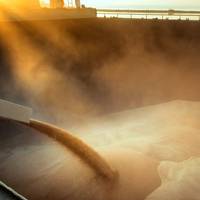OP/ED: Farm Facts

USDA Study Underscores Value of Inland Waterways to U.S. Agriculture.On August 28, U.S. Secretary of Agriculture Sonny Perdue and Assistant Secretary of the Army (ASA) for Civil Works R.D. James toured Mel Price Locks and Dam in Alton, Illinois, and held a Town Hall Meeting to discuss the importance of the waterways, agriculture and the U.S. economy. At the event, Secretary Perdue briefed agricultural and waterways stakeholders on a newly released study – Importance of Inland Waterways to U.S. Agriculture – from the U.S.
Shipping Sector Emissions: LNG, Methanol Lead the Pack
A recent JRC report finds that fuels like liquefied natural gas (LNG) and methanol are the most promising alternatives to drive decarbonisation of the shipping sector and ultimately contribute to the fight against climate change. Market penetration by alternative fuels has already begun with ship builders, engine manufacturers and classification societies by introducing greener ships running on cleaner fuels. Shipping is more fuel-efficient than road transport: it requires 2-3 grams of fuel per ton per km, compared to road transport by truck which is about 15 grams of fuel per ton per km. However, its greenhouse gas emissions are substantial, representing 4% of the EU’s GHG emissions in 2013, and growing fast.
Brown Water Industry Currently ‘In Transition’
The profitable process of moving products through North America’s vast inland waterways systems is increasingly dependent on vessel owners and operators finding and incorporating new technological means and methods to increase efficiencies. That was a core message at a recent meeting sponsored by the Ship Operations Cooperative Program (SOCP) and held in early March at the Litton-Avondale Shipyard. According to American Waterways Operators’ Ken Wells and others who spoke at the conference, market expansion projections are flat both in terms of materials moved and the overall customer base of shippers. Thus, the onus is squarely on owners and operators to ensure that their fleets are adequately outfitted to save precious time, money and fuel.
Technology, Image Top Inland Agenda
The North American inland marine market is neither technologically archaic nor as environmentally hazardous as many individuals outside of the marine market may think. These two issues dominated a recent meeting sponsored by the Ship Operations Cooperative Program (SOCP) held in early March at the Litton-Avondale Shipyard. The profitable process of moving products through North America's vast inland waterways systems is increasingly dependent on vessel owners and operators finding and incorporating new technological means and methods to increase efficiencies. Speakers from industry leading companies such as Kirby Barge Co.; Ingram Barge Co.…





